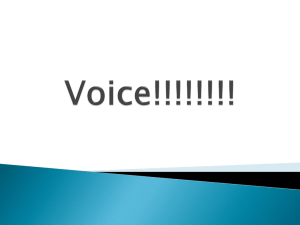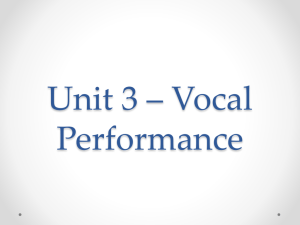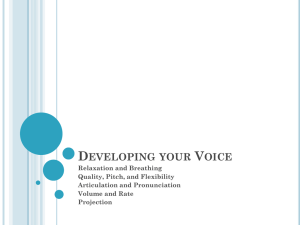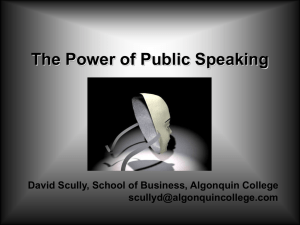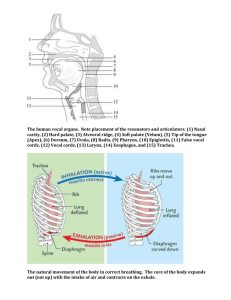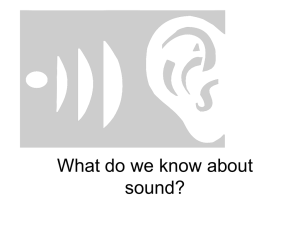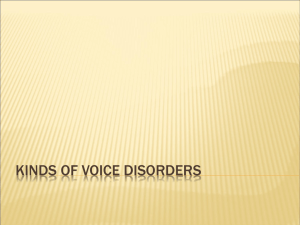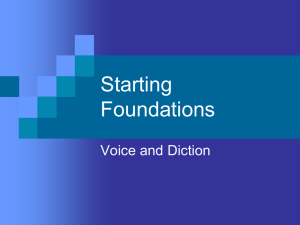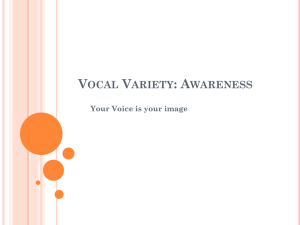8. Voice Production
advertisement
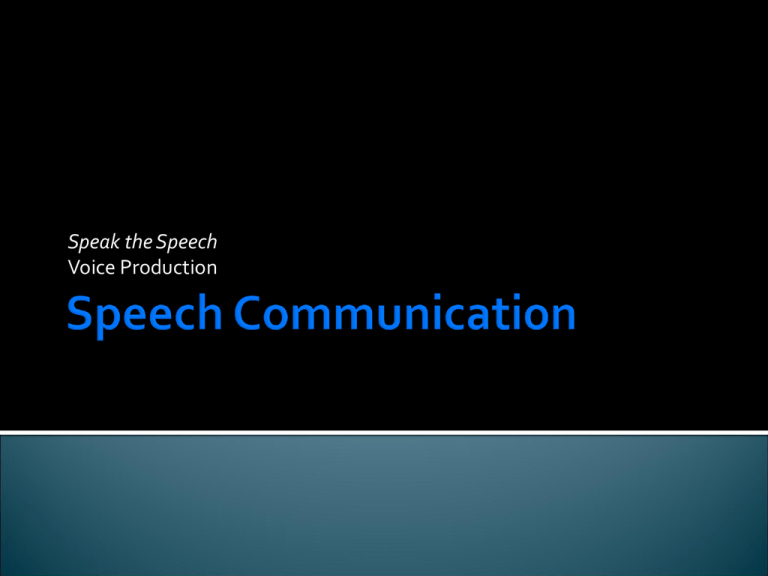
Speak the Speech Voice Production amplify articulation articulators audibility cartilage circumflex diaphragm flexible inflection intelligible palate phonation pitch resonance resonators respiration What qualities should you develop in your voice? How do you produce vocal sound? Why is diaphragmatic breathing important? What is meant by vocal quality, pitch, rate, and force? What exercises can you do to achieve flexibility in vocal quality, pitch, rate, and force? What is the cause and cure of poor articulation? What standard for pronunciation should you follow? Oh—(That’s news to me.) Oh—(Don’t be so dumb.) Oh—(I never would have thought it possible.) Oh—(That’s a small item.) Oh—(That hurts!) Oh—(How beautiful.) Oh—(How revolting.) Oh—(I get the point.) Oh—(What a fish story.) Oh—(I’m so sorry.) Oh—(Look out!) Oh—(So you thought you could get away with it.) What qualities should you develop in your voice? Voice reveals background, attitude, education, health, and personality Develop a voice that is easily heard, pleasant, flexible, and intelligible How do you produce vocal sound? Respiration (breathing) Phonation (vibrations of vocal cords) Resonance (amplification and enrichment—bones and sinus cavities in nose, throat, mouth) Articulation (molding sound into words— jaw, palate, lips, teeth, tongue) In order to be easily heard, you need a forceful, controlled breath stream which comes form the first phase of voice production: proper breathing Check your diaphragmatic breathing with the following exercises: Lie on floor, hands on diaphragm, pant Stand up with hands on diaphragm, feel hands move Inhale deeply, hold for five seconds, exhale breath slowly, again but say “oooooh,” repeat with other vowels You can improve your tone and achieve greater flexibility when you have a relaxed, open throat and when you use the resonators to full extent. For an open throat, practice the following exercises: Rag Doll: collapse, hang limp, slowly rise Head Roll: slowly circle head, dead weight, mouth open. Keep the movement slow, smooth, continuous Yawn: open throat feeling. Now say “Ah” as you exhale; repeat with other vowels; count to twenty. ▪ Roll on, thou deep and dark blue ocean, roll. –Byron For resonance, practice the following exercises: Yawn: close mouth, add “mmmmmmmm.” Push with diaphragm for strong air flow. Feel lips vibrate. Hum: feel head, nose, chin, chest vibrate Change tone to suit meaning: ▪ ▪ ▪ ▪ ▪ ▪ ▪ Grunt Roar Coo Crackle Bang Swish bubble Tinkle Wheeze Buss Splash Gurgle Clang Pitch Highness or lowness of voice 2-3 octave speaking voice, too often people only use four or five note variance ▪ High pitch—excitement, timidity, weakness, extreme youth ▪ Low pitch—assurance, strength, poise, disgust, despair, sadness ▪ General speaking, use lower half of range; medium-low tone is most pleasing to listener. Inflection–work toward flexibility ▪ Inflection changes occur within syllables ▪ Rising inflection suggests uncertainty or incomplete thought yes Should we go? ▪ Falling inflection suggests finality, conviction, completeness of thought yes We will stay here. ▪ Circumflex inflection suggests rich double meanings—sarcastic, subtle, humorous oh oh ▪ Step changes occur between words not It’s go He always home. will cold. For an greater pitch range, practice the following exercises: On deep breath, count to eight, saying each number on a higher pitch than the one before. Talk, don’t sing. Then talk down the scale from eight to one. Begin high—a little higher still—now very low— now very high—speak at a medium pitch—again very low—can you make it lower—and back to a medium pitch For an greater pitch range, practice the following exercises: I am terribly tired and discouraged What a beautiful view. Watch out! He’s got a gun. Get out of here. I hate you. Well! What do you think you’re doing? I know. It’s the tenth time you’ve told me. I am so lonely I can’t stand it. My brother is the best pitcher in the league. I am so excited. We’re going to Bermuda. I am absolutely positive that I sent the letter. For an greater pitch range, practice the following exercises: “Oh, yes, you don’t say.” 1. 2. 3. 4. 5. 6. Rate means the speed of your speaking Affected by pauses between words, length of vowel sounds ▪ Slow rate—sorrow, deliberation, reverence, doubt ▪ Fast rate—excitement, anger, nervousness, happiness Flexibility of Rate Count 1-20 (shift every six numbers) ▪ stretch out vowel sounds at slow rate but no pauses between numbers ▪ Repeat with short, clipped vowel, long pauses between “The snow is falling down.” ▪ Short quality—excited ▪ Long quality—sad ▪ Moderate rate—state a fact Force refers to volume or energy with which you speak Force for audibility Force is varied to communicate meaning through word emphasis ▪ Put force on different word to evoke a different meaning each time. ▪ “He’s giving this package to Morris.” ▪ How many meanings can you get from these sentences? ▪ Is Linda flying to New York this summer? ▪ Did Tim promise Dave to meet him here at 3:00? ▪ She gave him the blue book. Tongue Twisters: Would Wheeler woo Wanda if Woody snoozed woozily? Two teamsters tried to steal twenty-two keys. Six slim sleek saplings. A big black bug bit a big black bear. Better buy bigger rubber baby buggy bumpers. Fill the sieve with thistles; then sift the thistles through the sieve. Peter Piper picked a peck of pickled peppers. Read with clear articulation: To sit in solemn silence in a dull, dark dock, In a pestilential prison, with a lifelong lock, Awaiting the sensation of a short, sharp shock, From a cheap and chippy chopper on a big, black block! --Gilbert and Sullivan Enunciate the last sound: coming going running friend dead across Clearly articulate: gentlemen—(not gen’lmen) city – (not cidy) government—(not gov-ment) geography--(not jog’phy) twenty—(not twenny) hundred—(not hunnard) don’t know—(not dunna) singing past talking Three definite pronunciation regions in the U.S. (New England, Southern, General American) National announcers Educated people in your community weather—whether formally—formerly conscious—conscience statue—stature accept—except ate—hate precede—proceed wandered—wondered adapt—adopt affect—effect which—witch wear—where what—watt win—when ladder—latter madder—matter whither—wither Three voice improvement exercises Work on breath control, clear articulation, correct pronunciation and all other elements of quality voice production Fill out the activity sheet Select two tongue twisters Choose four line nursery rhyme Recite twice at a moderate speed on one breath ie “Mary had a little lamb” or “Twinkle Twinkle Little Star” Write an original 50-80 word paragraph using the ten commonly mispronounced words: Just, get, for, again, any, poor, sure, your, our, can’t Present the exercises in the order of your activity sheet ▪ Tongue twister (from memory) ▪ Nursery rhyme (from memory) ▪ Original paragraph (read off activity sheet)
